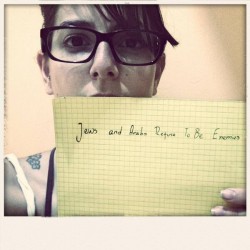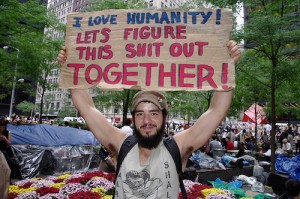The horrific situation in Gaza today is beyond anything I can imagine for the thousands and thousands of people who are living—at the very same moment that I am writing this—in the deepest fear, loss, grief and pain they will ever know.
And while it is certainly not my intention in any way to down play the intensity and severity of the last two weeks of fighting, it’s really got me thinking about the kind of racial and religious conflict—even of the subtlest kind—that trickles right down to the level of this peaceful city I’m in, so many thousands of miles away.
Race and religion is an integral part of our country, Malaysia. The government is formed of a coalition of race-based parties—the Malays, the Chinese and the Indians. Schools are mostly multi-racial but there are separate language-specific schools where the main medium of instruction is Mandarin for the Chinese community or Tamil for the Indians. It is widely known that university admissions are moulded around a race quota. It is also common knowledge that the Malays/Muslims are offered certain benefits (financial, residential, political, welfare) which people of other races or religions are not privy to. In every form we fill out—from our official national identity cards to a membership at a spa—we are asked to indicate our race and religion.
So yes, race and religion form an integral part of our landscape. It is what seems to divide us—those with privilege and those without; those who are favored and those who aren’t.
But on an everyday basis, you’d be forgiven for not thinking so. Tourists often wonder at how peacefully multi-cultural and multi-racial we are as a people. Because at the heart of it, we are. I believe we are peaceful.
The differences and the separation only really happen up in the upper echelons of the faceless bureaus and ministries which we will never see. There’s this unspoken narrative that comes from above—in the form of policies, educational systems, religious laws, histories, media—that spells out a difference we would probably never notice otherwise. Racial conflicts and tensions are carved into spaces where they aren’t usually seen or felt.
In all the places I have ever worked, played or idled in in Malaysia, I have met people who have won over my heart and made me fall in love with humanity. It has nothing to do with their race or how they pray (if they pray).
I’ve had the privilege of knowing Malays who have never left Malaysia, Malays whose diplomat fathers moved them all over the world, Chinese from Chinese schools, Chinese with Irish accents, Muslim Indians, Catholic Indians, Indians who didn’t believe in anything at all. At school, I became best friends with people who were English, Japanese, American-Greek, Greek-Greek, Jewish, Atheist, Dutch, Indonesian, Catholic…. I mean, okay, whatever. After a while, all you really want to know is whether they’ll lend you the latest Indigo Girls CD.
The largest Muslim festivity of the year, Aidilfitri, is being celebrated this weekend; in the month leading up to it, Ramadhan, all Muslims have been fasting from sunrise to sunset. But it’s not really just a month for Muslims. In Malaysia,we’re all celebrating—we’ve been breaking fast with the Muslims; we’ve been buying big food hampers as gifts; we’ll be attending their open house parties because we know that there’ll be all that delicious traditional food that all Malaysians know and bond over. (Because every Malaysian knows that the only important thing to know is where you’ll find the best curry, or satay, or kuih).
The whole process of shared dinners, gift hamper and parties repeats all over again during Chinese New Year, Deepavali, Easter, Vesak, Christmas, the Chinese mooncake festival, the Hindus’ Thaipusam, everyone’s wedding, each newborn baby’s one-month birthday party or baptism. We have the most number of public holidays in the world (18 this year alone) because we’re all just celebrating each other’s festivals, all the time.
We’re also mighty proud of the fact one of our favourite phrases contains four languages within a sentence: “Wei macha, you wanna makan here or tapau?” (Hey brother (Tamil), you wanna eat (Malay) here or take-away (Chinese)?) And of course it’s about food again.
Down on the ground, away from ministries and official forms, the language we speak at home and the God(s) we pray to is not an issue.
We are simply people, hanging out with other people, with all of the same hopes, fears, dreams and loves, friendships in our lives.
All this fighting—whether it’s the literal violence of Gaza or the KL’s insidious policies that creep into our lives—almost always ends up being about pleasing some God, racking up the right spiritual merit, making it to heaven, securing a final happiness.
One side tells another (or believes) that it’s all for a ‘greater good’, that it’s salvation, a form of redemption, a cleansing of negativity… The other side retaliates, also believing in their ‘greater good’, salvation or whatever other reason there can be to justify the deaths of over 800 innocent people in two weeks.
But the saddest thing of all is this: that everything they say they’re fighting for—this enlightenment, this righteousness, this virtuous goodness—is already present and practiced by the very people they claim to represent.

The Facebook Page, Jews & Arabs Refuse To Be Enemies, which has gained a following of almost 30,000 since it started on July 10, is filling up with photos of Jews and Arabs taking a stance together against violence There’s also been plenty heart-warming news over the past month of Jews and Muslims breaking fast together daily in cities throughout the United States, setting an example of solidarity, unity and peace. That’s a lot of people. Probably more than the number of people leading those wars.
These campaigns are beautiful, united, compassionate, loving, full of friendship.
They are also real.
I know it is from my own experience of breaking fast with my Muslim friends; of exchanging Christmas presents with Christian friends; of simply sitting with four other people of four other races or religions, drinking tea (there’s always time for tea in Malaysia!) and talking about our week.
If there is indeed a God, or Gods—those great compassionate beings we ask for blessings—wouldn’t he be filled with a gladness to see this? Wouldn’t they be pleased and proud to know that we found all that goodness, righteousness, harmony and happiness all by ourselves, without needing a war in their name?

I sometimes wonder if I’m being too idealistic, too naive; if I’m living in a privileged bubble. But I know my own multi-racial, multi-cultural, multi-faith experiences to be true, and even if they exist on a tiny scale, the fact is that they exist. They are possible. They are real.
Is it really asking too much that we strive to make this real for more and more and more of us? To refuse violence? To stop making enemies? To wish for friendship, love, happiness, protection, peace?
Because the thing is, if we look around us—no matter where we come from, where we’re going, what we speak or who we fold our palms to—isn’t that all we really want?
Love elephant and want to go steady?
Sign up for our (curated) daily and weekly newsletters!
Editor: Catherine Monkman
Photos (from top): jorgebanha/Instagram; Jews & Arabs Refuse To Be Enemies; David Shankbone/Flickr Creative Commons


 Share on bsky
Share on bsky





Read 0 comments and reply